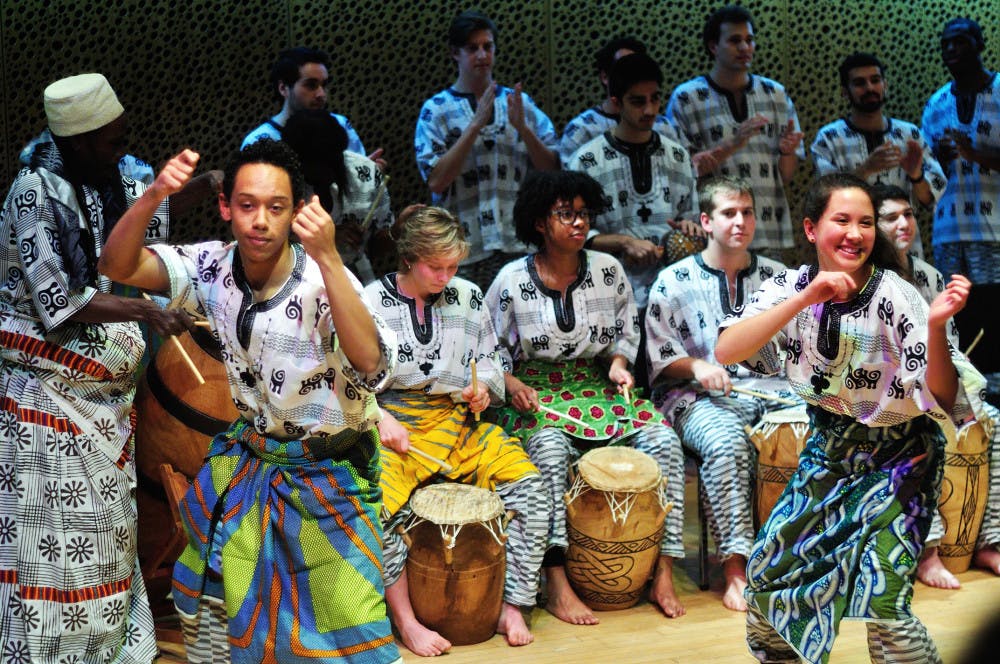Western and Ghanaian rhythms exploded together on stage at the Grant Recital Hall during the Ghanaian Drumming Concert Wednesday night. The performance was the culmination of the course MUSC 0640: “Ghanaian Drumming and Dancing Ensemble” and incorporates both student and faculty work.
Over the course of the semester, students in the class learned about Ghanaian culture in addition to drumming techniques and traditional rhythms. Students wore traditional Ghanaian costumes and ate a Ghanaian meal prepared by a Ghanaian family before the performance.
Among the night’s selection was a collaborative tap-dance and drumming piece performed by five students enrolled in the class and a duet rendition of Beethoven’s “Für Elise” performed by University Organist Mark Steinbach and Teaching Associate for African Drums Martin Obeng, who teaches the course.
After the duet, Obeng said the song was part of a wider attempt to close the gap between Western and African music.“Hopefully there will be thousands of Africans drumming with piano players one day — I mean what’s wrong with that?” he said.
At the end of the last ensemble performance, audience members were escorted one-by-one from their seats; eventually, the entire audience was invited down to the stage. The music crescendoed as audience members arrived to participate in curated line dances led by students and two guest musicians.
“I didn’t expect it to be this interactive,” said Isaac Lima ’16, adding that the audience participation “seemed very natural and very interesting.”
The course provides students with an understanding of African tradition, Obeng said.“It’s not just about drumming at all; it’s about culture,” he said.
“Students learn foreign texts, rhythm and foreign language,” he said, adding that he sees Ghanaian drumming as a way to fully immerse oneself in a part of African culture.
“This is one of the few classes where students can actually dive into the traditional ways of practicing the culture,” he added. “Any students who are taking classes about Africa — this is the essential part of what they’ve read.”
Students enrolled in the class said they appreciated Obeng’s adherence to Ghanaian tradition and authenticity.
“Mr. Obeng had us name drums by the right name out of respect for that instrument,” said Hool Johnson, a graduate student at the Rhode Island School of Design. “You would know the rhythm if you went to Ghana tomorrow, really.”
Students also said they appreciated the class’ theory-free, intuitive approach to music.
“It’s a really cool way of learning music differently, as opposed to reading notes and playing them,” said Sam Frolichstein-Appel ’19. “It’s all about learning by passing down; we hear it and we play it. There is no written music, and we kind of decide on the forms and the arrangements of what we’re playing.”
Obeng said he aims to make the class accessible to students who lack musical backgrounds.
“The philosophy behind it is that I teach it to everyone,” he said. “It’s more for students to come in and find themselves. … You come in with nothing and you leave with something.”
Several students said they would recommend the class to any Brown students willing to step out of their comfort zones.
“I would encourage more people who are musicians to take it, because it’s just such a different take on music,” Frolichstein-Appel said.
The class, offered in both the spring and fall semesters, enjoys popularity on campus. Next semester’s class only has one seat remaining, according to Banner.
“I used to ask students, and I ask myself, too: ‘What is it about African drumming that is catchy or interesting to other students?’ You know, there’s just something about it,” Obeng said.





